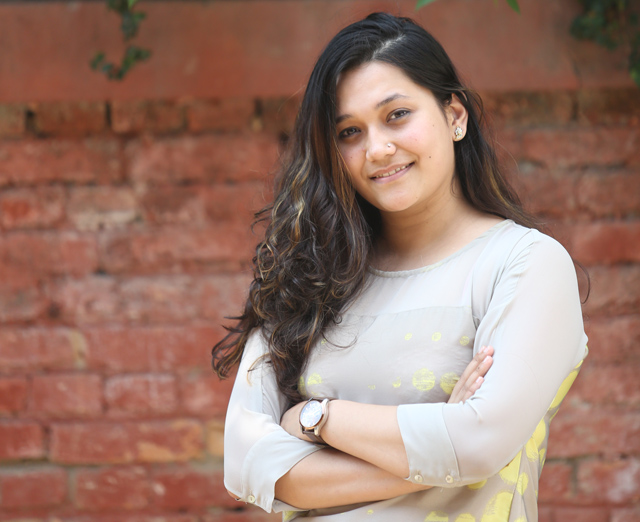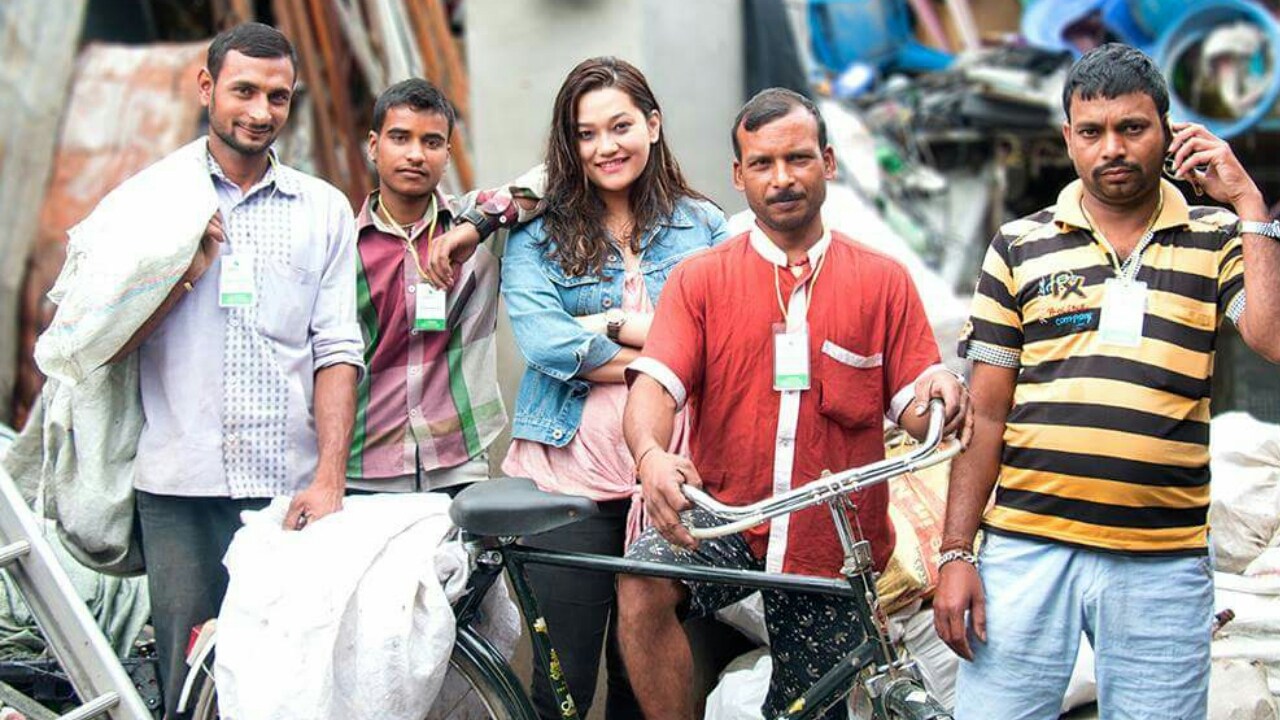SOCIAL ENTREPRENEURSHIP BLOG SERIES ISSUE NO. 9: CONVERTING TRASH INTO MONEY: THE STORY OF KHAALISiSi
A bottle of whiskey being used as a water bottle. A white sack filled with empty Pepsi bottles ready to be dispatched. A scene that you usually don’t see in an office. But this story is being narrated from an office. Sitting at a desk, Ms. Aayushi KC is talking with a person, planning how they can collect trash. Aayushi KC is a woman from Kathmandu, who made recent headlines in some of the national newspapers for leaving a job at a bilateral development agency and starting a trash collection business. After reading news about her initiative, Bikas Udhyami decided to learn more about her story and her thoughts on social entrepreneurship.
When did you decide to start Khaalisisi? What was your early motivation?
Honestly speaking, I was working on this idea for almost one year before I started. I was working on a USAID project at that time. It was a kind of stable and secure job. I had an idea of solid waste management company, but could not do two things at a time. So the time came when I had to decide, which way I wanted to go. My idea kept coming back to me and my inner voice was saying ‘let’s not be limited to thinking of it only, but go for execution.’ Then I registered the prototype of Khaalisisi in February and launched Khaalisisi in June 2016.
You said you were preparing for the idea. What were the things you were preparing?
I am not from a technical background, so I used to think that I was not ready to start a waste management company. But as soon as I made my mind up to do this, I started to read more about the different aspects of solid waste management i.e. what are the kinds of waste we have, how we can classify these, what impact does recycling create etc. These aspects demanded serious reading. I planned to research and study everything beforehand, but that didn’t work out because learning takes place always in the middle. One has to start and learn. My team members also helped me in this journey.
Any incident you remember that brought you to this field?
Because Kathmandu is a huge mess. If you look around at the streets and your home, we are so brutal with our waste. Our cultural mindset is one of the reasons. We don’t know that we have to separate waste. Though the government has dictated through laws that we have to separate the waste at source, this is not implemented either by the government or by us as citizens. It is because we don’t know how to do it and why to do it. There are some people who try separating waste, but ultimately the metropolitan truck comes and puts all the different type of waste together. Seeing this, people’s motivation to separate waste goes down.
This is the traditional problem we have. If you visit the landfill, you will see how unmanaged it is. So we decided to find an innovative solution to this traditional problem. And here we are as Khaalisisi.com, a digital platform for waste management.
How is the business going?
We have been very fortunate that people have been supporting us from the very beginning. This shows that people actually are interested in new innovative ideas. They are happy to be our customers. When we launched in June, our target number of Facebook likes was just 5000, but we were able to reach this target within a month. This shows how people are curious about new innovations and in a way about environmental issues. There was no service earlier, but when we started to provide this service they were interested to use it.
How do you operate?
Everyone has trash, but we collect only recyclable dry wastes. We take dry recyclables such as paper, plastic, metal, aluminum, electronic waste, steel, bottles, and others. However, we do not collect wet/organic waste. Interested clients can schedule pickups of contact us for queries through phone, email, our website, or our Facebook page. People do not call our KSFs directly, the pickup is scheduled through us. We give our Khaalisisi friends Khaalisisi issued ID cards and a notepad for record keeping. People can either sell or donate their trash. If they donate, we separate 10 percent of the money for the welfare of our Khalisisi friends. For example, recently we provided an education scholarship for one of the sons of one of our Khalisisi friends.
Who are the Khalisisi friends? How do you choose them?
They are the ones collecting waste in the traditional way, but we are supporting them to do their work differently. Now they don’t have to go to every house saying ‘Khali Sisi Purana Kagaj’. Our platform is providing them with a smart solution. The houses in Kathmandu are getting higher. Their voice doesn’t even reach the top. Because of this, their business is declining. Hence our idea is not to replace them, but include them in our platform. Till date, we have 20+ Khaalisisi friends and we are expanding.
What were the early challenges?
Challenges came from the very beginning when we went for company registration. The kind of objectives our company had, caused problems in registration because they were completely new. It was very hard to make the officials understand and we were registered as Kabadiwala. I am happy about that, but it tells that our government is not prepared to welcome innovative ideas in Nepal. We really need more openness towards innovation from the government side.
Recruiting trash collectors in our network was also challenging. They are very tied to their own circle. For a girl to go and talk to them was difficult. One of them even asked if we have any men in our office. At that time, I was little nervous. Telling them about the digital platform was also difficult. It took time to trust us. But as they joined, they started to make some extra money through our network. The same thing applied to our clients at the beginning. They were asking us how we were different from the regular ‘Kabadiwala’. But we were able to explain them our purpose.
Any economic problems?
Not much. Our main challenge was people’s mindset. Otherwise, this field is fertile for business. Behavioral change is always tricky. The generation gap plays a vital role. Hence, we work with kids. We make them understand why these things are necessary. We don’t take the traditional route of organizing awareness camps etc. We simply link children from different schools and Khaalisisi friends. They know the important task they are doing and this will make them think. We organize waste tours named ‘School to the scrapyard.’ This was really fruitful. In our cultural setting, generally parents keep children away from ‘Kawadiwala’dais, but they should know how waste is managed and the role these common men play. Now they are able to talk straight, because they know their work and world. The kids of one school even made a small drama out of their visit experience. Khaalisisi friends are also happy with this interest and to be able to share their stories.
How can people contact and sell their waste through your network?
There are multiple ways. They can message us on Facebook, call us or even schedule the pickup from our website at the time of their availability. Our Khalisisi friends then visit the client’s location to collect the waste.
Do you keep anything except organic waste?
While working we got to understand that Nepal lacks a full-fledged waste management industry. There is no transparency in waste. Because of this reason, sometimes we can’t take things that cannot be recycled properly. What we take depends on what big collectors are taking from us. So, there are certain limitations even within waste. But we are working on that. Some types of wastes are very difficult and expensive to send to India. Sometimes the vendors lack economic sense and avoid certain products.
How do you manage these things?
When we collect waste from the people, all the collected waste goes back to the scrap collector. Then it is categorized into different types. After adding some value additions like labeling, folding etc., they are sent to respective places i.e. wholesalers and retailers.
How are you different from other traditional system then?
Right now, we are working as a digital platform, but we aim to become part of the waste management industry. We have seen many weaknesses in the current system and we try to work on those. There are no clear criteria on pricing or priority on management. The middlemen take all the profit. These things are to be addressed. We are focusing on building the ecosystem. Many people ask us why we don’t recycle ourselves. The reason is that recycling is a completely different business. It is the last step I say. Before this, we need sufficient waste. But the waste supply is not regular. As I said earlier, we are fighting against cultural barriers. The root of the problem is the mobilization of trash and we are working on that.
How do you earn? How you will it sustain economically?
We take commission from our Khaalisisi friends and it is subjective in that we take according to the nature of the trash and sometimes dependent on the quantity they collect.
We give them an ID card that increases their options and opportunities of getting more trash. They don’t have to roam around here and there for the whole day. There are some places like business houses, offices, apartments etc. where there are huge amounts of waste such as old electronic devices, but they are not allowed to enter. Our card gives them access to those places. So, it is a three-way benefit for all. In the return of this access and other benefits, they pay us the commission.
What are the impacts do you think Khalisisi is making on society?
Many people consider us as a normal agent, but we are more than that. It is just the tip of the ice-berg. Below that, we are working to eliminate cultural barriers, trying to make this sector respectful and more importantly are working towards finding a long-term solution to the problem of trash.
You can see the changes in our Khalisisi friends whose economic condition has improved close to 30 percent in a month when they started working with us. Another impact is that they are now called by their name. Previously they used to be called as ‘Bhaiya’. This may seem like a small thing, but it has a greater impact on our society where we often fail to value low-level workers.
From the waste seller’s perspective, they now believe that something will happen if they separate their trash. Now they see the potential even in waste. This motivation is also linked to environmental solutions. One glass bottle takes one million of years to decompose in the natural environment, whereas we are able to collect them in order for them to be recycled. We are diverting waste away from the landfill, where it was destined to end up previously. We are trying to work with the government to make the landfill more sustainable and technology friendly.

You earlier said that you had a problem in dealing with the government system. What do you think the government should do to make the environment good in Nepal?
I don’t want to blame government alone. It is not the time to complain all the time. It is the time to work. The government may have some limitations. For example, they are yet to attract experts in this field. Filling that gap, through public private partnership between government and the private sector is still a novel thing. This is the time when we should work with the government. We should give them innovative ideas and help them to implement these. Let’s tell them what we want to do, how we want to do, how much does it cost and how long will it take. I think the government is open to these kinds of things. We need to have a collaborative mindset. The government has many problems to tackle, so there are opportunities for us.
Any suggestions do you have for the upcoming young social innovators?
In Nepal, most of us still live with our parents. This has made our lives easier, but all at the same time has made us dependent. They provide us with a secure option. But let’s not take these things for granted. Let’s be a bit aggressive, try to do something and stop complaining. We often search for excuses for what we cannot do. We should leave this attitude behind us and should be determined in our work. Success doesn’t come overnight.
Website: http://www.khaalisisi.com/

